Christmas is just around the corner!
And with that comes the decorations, the shopping, the wrapping, and, of course, all the delicious festive food to share with your family and friends—including your pooch! But is festive food entirely dog-safe?
Well, the answer is yes…and no!
Yes, your dog can eat a Christmas dinner and safely join in on other festive eateries. But at the same time, many aspects of your traditional human Christmas dinner are not suitable, and even contain some toxic ingredients that could result in a Christmas trip to the vet.
So, read on for our full rundown of what can be in a Christmas dinner for dogs, which festive foods aren’t recommended and what should totally be avoided.
Can dogs eat Christmas dinner?
When it’s Christmas Day and grub’s up, there’s no doubt your dog will be well aware of a feast - especially with all those amazing smells. So you might want to treat them to a Christmas dinner of their own.
Hold your horses, though! Rather than scraping from your plates into their bowl, you’ll want to check whether their sensitive tums can handle all those rich, gravy-soaked treats.
What can dogs eat from a Christmas dinner?
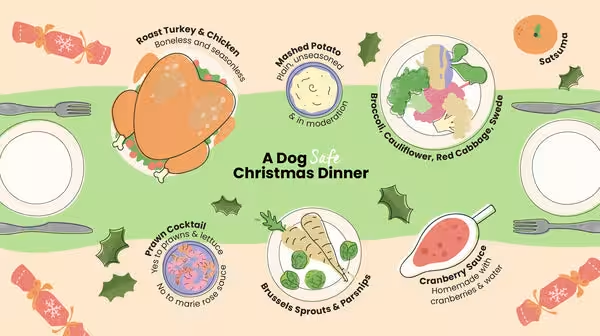
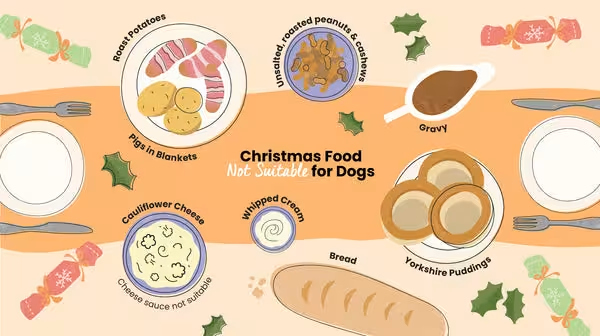
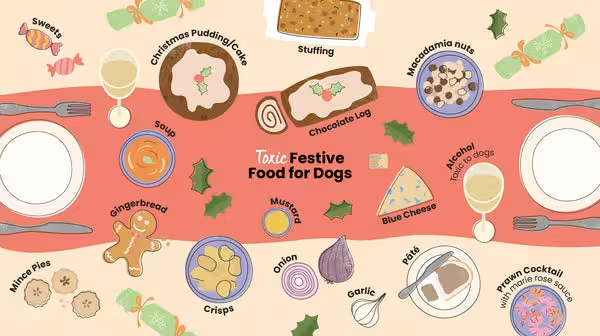
A traditional Christmas dinner is usually full of tasty whole foods and a satisfying mix of high-quality meat, veggies and carbohydrates - not a bad combo for a dog’s meal. However, some components of a Crimbo dinner are a no-go for hungry dogs - whereas, for the safe ingredients, there’s a knack to how you prepare them.
To avoid a sick dog on Christmas day, here’s the lowdown on each specific dinner element, arranged into tasty courses!
Christmas dinner starters
Here is the dog-based recommendation for each traditional starter:
Can dogs eat a prawn cocktail?
Yes and no! Dogs can eat Prawns, so long as they’re de-shelled and deveined, cooked without added seasoning and served in bite-size pieces.
Prawns are a great protein source, and contain omegas 3 and 6; essential fatty acids that contribute to good coat and skin condition, and joint health.
Dogs can also eat the plain iceberg lettuce with the prawns if they like it.
Avoid the tangy Marie Rose sauce that usually comes with a prawn cocktail, however, as this is high in fat, salt and sugar, so could cause a stomach upset.
For a delicious, 100% dog-safe shell-fishy treat, why not try our Skin & Coat Probiotic Meaty Treats ? Packed with shrimp and coconut, these lil’ beauties contain omega 3s and fatty acids to keep skin healthy and coats glossy. Perfect for those Christmas family photos!
Can dogs eat soup?
No - at least, not the soup that humans would eat. Soup is likely to contain ingredients not suitable for a dog, such as cream, extra salt, chilli, onions, garlic and other seasonings and spices. You might want to make a broth or soup containing only dog-friendly ingredients, but dogs like to chew and would probably prefer a meal with more substance.
Can dogs eat bread?
Yes, bread is safe for dogs to eat but don’t be making sandwiches a regular thing! Bread has little to no nutritional value to dogs, is quite fatty, and can often contain toxic ingredients like raisins and certain seasonings - especially at Christmas time! So don’t worry if grandma has slipped your pooch a little bit of bread roll under the table - no harm done. But always be mindful of certain toxic ingredients and over-feeding.
Can dogs eat pâté?
No. Pâté is an indulgent treat for humans, especially at Christmas - but it isn’t good for a dog’s health or digestion due to its high-fat content, which could cause pancreatitis - as well as high levels of salt and seasoning.
Christmas dinner main course
It’s time for the main event with all the trimmings - and it’s likely your dog is more than ready!
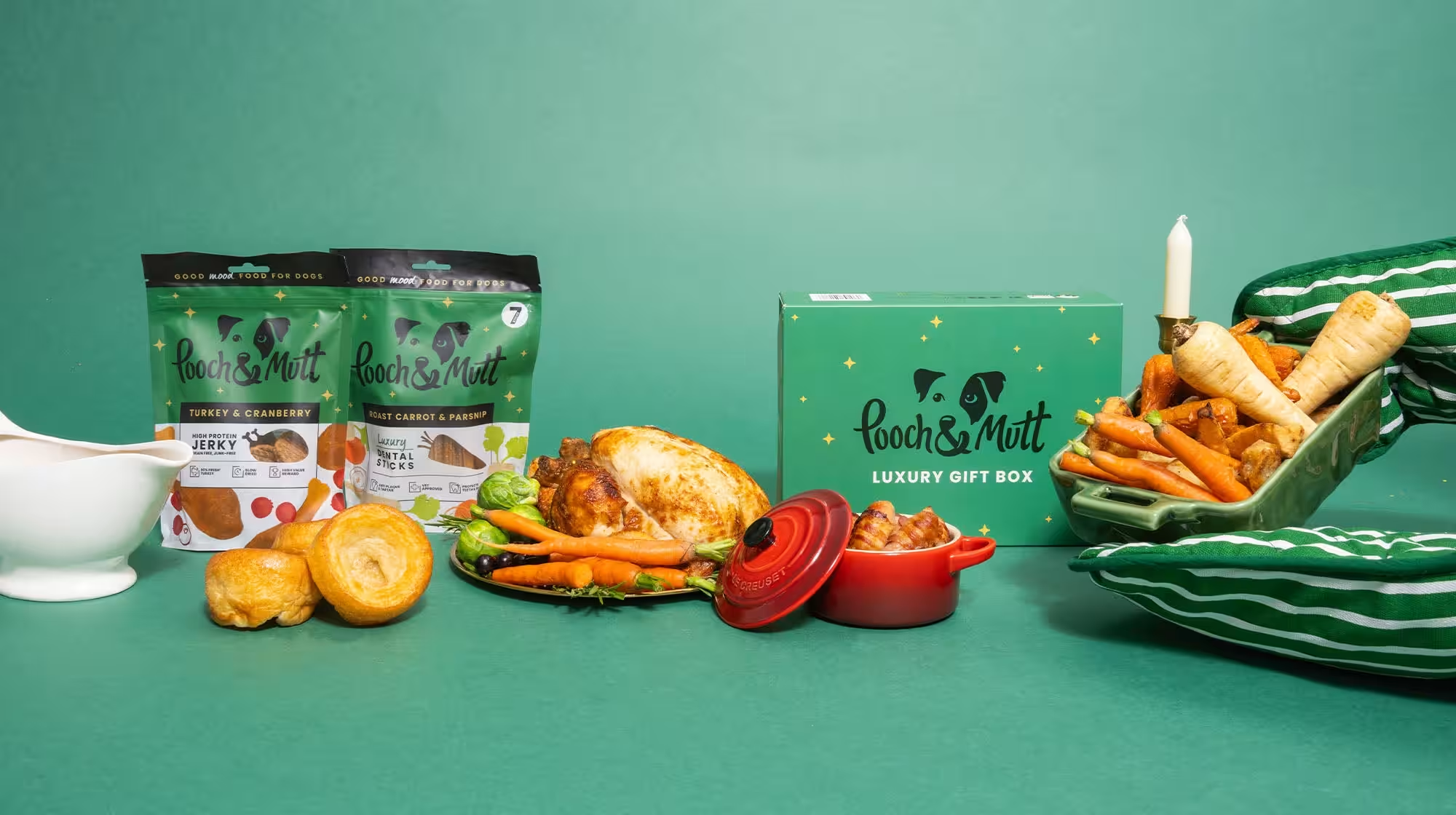
Let’s go into detail about whether dogs can eat roast Turkey and all the extras of a Christmas main course:
Can dogs eat roast turkey or roast chicken?
Yes! Your dog can eat Chicken or Turkey - just make sure it’s lean, white meat that doesn’t contain bones or the skin, and there’s no extra seasoning or flavouring.
Chicken and Turkey are both high in protein as well as low in fat (when prepared correctly), so either meat makes for a juicy, healthy option for a dog’s lunch.
Avoid the darker pieces of meat, which will be harder for them to digest; cut off the fatty pieces, and avoid the heavily seasoned skin. These parts of the poultry are high in fat which could cause sickness or in some dogs, trigger pancreatitis.
If you wrap your Christmas Turkey in Bacon or other extras, keep that for the people plates.
Can dogs eat stuffing?
No. Avoid adding stuffing to your dog’s Christmas bowl.
Though delicious, stuffing contains a lot of fats as well as garlic and onions, both of which can wreak havoc with your dog’s stomach and even cause anaemia.
Can dogs eat roast potatoes?
Not really! Dogs can eat plain, cooked Potatoes, but roast potatoes are slightly too fatty and starchy for them to digest.
As an alternative, when cooking up the roast, boil some potatoes or mash a small amount for your dog without adding any salt or butter.
Serve a small portion as most of the meal should be made of meat and veg to avoid your dog being bloated and lethargic later.
Can dogs eat mashed potatoes?
In moderation. Feed your dog a small amount of unseasoned, plain mashed potato as a substitute for those rich roasties. Just make sure it’s not the main component of the meal - take up the space with veggies instead.
Can dogs eat pigs in blankets?
No. No matter how much your pooch might love them, pigs in blankets - those dinky sausages wrapped in bacon - are just too high in fat and salt for your pooch’s delicate tum.
Can dogs eat Brussels sprouts?
Yes! Whether you're a lover or hater, lots of dogs love a Brussel Sprout or two. They're packed full of fibre, vitamins and minerals, are low fat, and are even thought to have cancer-fighting properties. But beware: they do cause smelly dog toots! Be sure to steam or boil your dog’s sprouts and chop them up to avoid choking hazards, with no added salt, oil or butter for seasoning.
Can dogs eat parsnips?
Yes. Parsnips are fine for dogs to eat, raw or cooked, and provide B vitamins, vitamins C and K, and potassium.
They’re also digestible and a good source of dietary fibre. If cooking them for your pooch, make sure they’re boiled and don’t add any flavourings like honey glaze, oil, butter or salt.
Serve them chopped or mashed in your lucky pooch's bowl.
With the rich, savoury taste of roast Carrot and Parsnip, our dental sticks also include SHMP that helps fight plaque and protect pooch teeth and gums.
Can dogs eat swede?
Yes! Swede is a healthy and tasty food for your pooch’s Christmas lunch.
Similar to parsnips, they contain beneficial vitamins and potassium and are highly digestible.
Swede can be served to your dog raw or cooked, so long as you boil and serve chopped or mashed without any glaze, oil, butter or salt.
Can dogs eat broccoli?
Yes! In moderation, broccoli is a fantastic dog food at any time of year - it's super healthy, with tons of vitamins C, K and some B vitamins, as well as being high in fibre.
It also contains antioxidants that boost anti-inflammatory properties and fight harmful free radicals. Serve broccoli steamed or boiled with no extra salt or oil.
Broccoli can come in big pieces, so be sure to chop it into bite-sized chunks to avoid the risk of your dog choking. Just like with sprouts, broccoli can make your dog gassy! If you find that they’re too gassy after eating, perhaps reduce the portion size next time.
Can dogs eat cauliflower cheese?
Ideally no - creamy cauliflower cheese is too rich and full of toxic seasoning which could cause a stomach upset.
Cauliflower on its own is a preferable option, steamed or boiled with no added salt. Served this way, it’s a tasty side for your dog packed with vitamins C, K and B, and it’s high in fibre.
Remember to chop cauliflower florets into bite-sized chunks.
Can dogs eat Yorkshire puddings?
No. Though Yorkshire puddings are truly scrumptious for most humans, they are made of flour, eggs and milk and offer no nutritional value to a hungry pooch. As they're cooked in oil, they're also very rich and likely to cause your dog bloatedness, lethargy or a stomach upset.
Can dogs eat red cabbage?
Yes. Red cabbage adds a burst of colour to a Christmas dinner plate, as well as a boost of vitamins and antioxidants.
If you feed it to your dog, make sure it's boiled or steamed until soft; not fried in lots of oil or butter.
Don't add any extra salt or seasoning and chop it into munchable pieces, as it can have some parts that are tough to chew.
Also feed in moderation, as it contains a lot of fibre that can cause digestive problems if overeaten.
Christmas Condiments
We humans love slathering on the sauces come Christmas but what, if any, Christmas dinner condiments are safe for a dog to eat?
Can dogs eat gravy?
Sadly no! Most human gravy is very high in fat and salt.
It's just too rich for your hungry pooch and could cause stomach upset. It could also contain onions and garlic, which is another no-no for dogs.
If you’ve made the gravy yourself and know exactly what ingredients have been used, a small amount might be ok to drizzle onto their meal - but always err on the side of caution.
Can dogs eat cranberry sauce?
If made with dogs in mind! A small dollop of cranberry sauce is ok for a dog to eat, especially if you’ve made it yourself with cranberries and water.
If you’ve bought it, always check the label. If it contains grapes or raisins it should definitely be avoided - and be wary if it’s sugar-free, as it may contain artificial sweeteners such as Xylitol which is lethal to dogs.
If you aren't sure, better give cranberry sauce a miss.
Alternatively, opt for our Turkey & Cranberry Jerky, specially made for Christmas! Packed with tender, protein-rich Turkey and juicy Cranberries, our Christmas jerky makes for a luxurious, high-reward treat.
Can dogs eat mustard?
No. It’s too potent in flavour for a dog and offers no nutritional value.
As a general rule, keep it plain when it comes to your dog’s Christmas lunch, sticking to whole foods like lean meat and veggies.
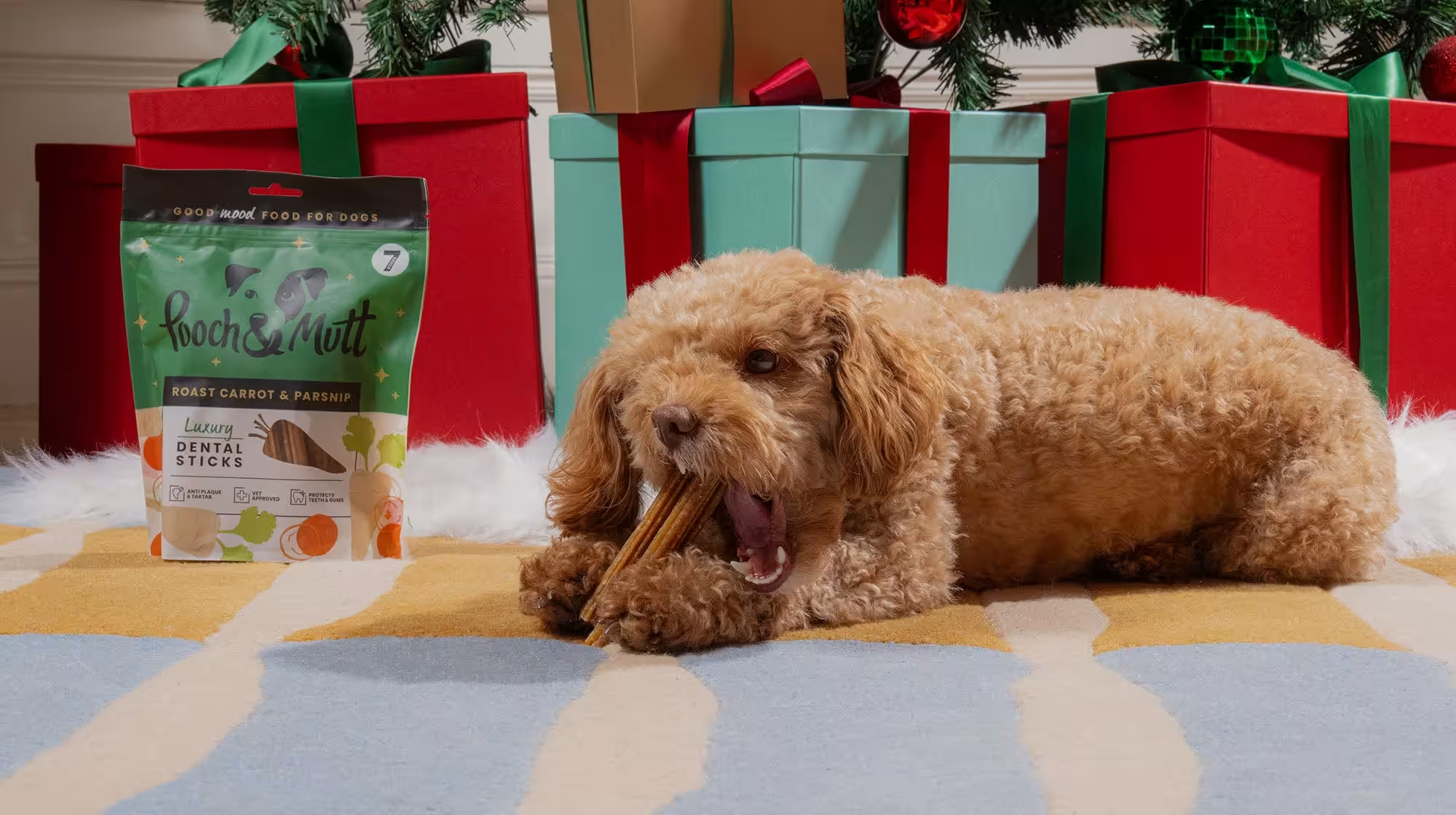
Christmas dinner dessert
Dessert time! By now, you and your dog will be suitably stuffed, but there might be room for more. So what can a dog eat for Christmas dessert?
Can dogs eat Christmas pudding or Christmas cake?
It’s a no for dogs! Christmas pudding and cake are usually packed with raisins, alcohol, chocolate and other strong flavourings that are poisonous to dogs.
Grapes, raisins and other fruits found in Christmas puddings are also toxic to a dog’s kidneys and could cause renal failure, so it’s safer to avoid them altogether.
Remember, dogs don’t have a sweet tooth, so they’re not missing out.
Can dogs eat mince pies?
No, dogs can’t eat mince pies. As well as being high in sugar, mince pies traditionally contain raisins and sultanas - two of the most toxic foods for dogs.
When consumed by dogs, they can cause severe bouts of sickness, diarrhoea and even kidney failure. If a Christmas catastrophe occurs and your dog gets their chops around a mince pie or two, be sure to contact a vet immediately.
Can dogs eat gingerbread?
No. Gingerbread is high in sugar and fats, making it one to avoid as a dog treat.
Lots of gingerbread also contains nutmeg, which is toxic to pooches and can even cause seizures and hallucinations.
Can dogs eat satsumas?
Yes. Satsumas, oranges and tangerines are juicy Christmas treats that offer a boost of vitamin C for dogs.
Just be sure to remove all seeds, skin and tough pieces, and feed in moderation.
If you’ve never fed your dog this fruit before, introduce it slowly - they may have an allergy or respond negatively.
Can dogs eat blue cheese?
Most dogs love cheese, but blue cheese is quite an extreme treat for a dog.
It’s not only high in salt, fat and flavour, but it contains various moulds that we humans can handle, but dogs may not.
If you want to offer a small piece of cheese to your dog, keep it mild, low fat and low salt.
Can dogs eat whipped cream?
Nope. Don’t feed your pooch cream, or they’ll likely feel uncomfortable come Christmas evening!
Though some dogs may have a few licks and have no ill effects, it’s simply too rich for most dog digestive systems.
Can dogs eat chocolate?
It probably doesn’t need saying, but don’t feed your dog any chocolate at Christmas - so your favourite Chocolate Log is a big no-no!
It’s one of the most well-known toxins for dogs due to its theobromine content - and there are much higher cases of chocolate poisoning in dogs over the seasonal period.
Keep all chocolate, including that wrapped as presents, well out of your dog’s reach to keep them safe.
Can dogs eat sweets?
No! As much as we love nothing more than cracking open a box of our favourite sweets whilst watching some Christmas telly, don’t be tempted to throw one for your dog. Not only are sweets full of sugar that can cause unnecessary weight gain for your dog, but sweets often contain sweeteners like Xylitol which are very toxic.
Xylitol is especially common in ‘sugar free’ sweets, and when consumed by a dog can lead to symptoms including vomiting, lethargy, seizures, and even liver disease.
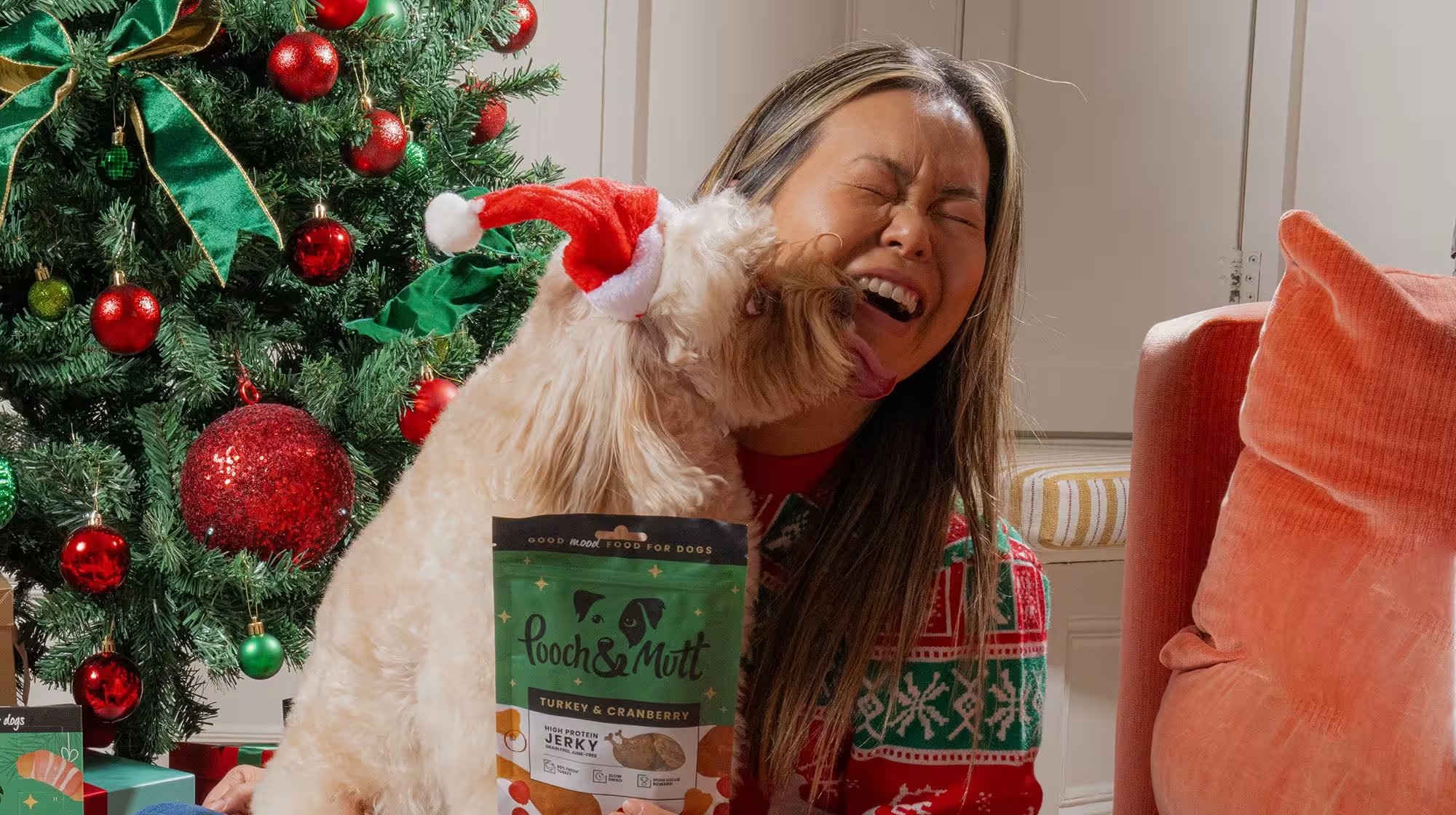
Post-Christmas dinner snacks
With gravy-soaked dinner plates and demolished desserts, you’re probably feeling like you couldn’t possibly eat another thing. That is until you hear the familiar sound of something savoury being poured into a sharing bowl!
And your dog’s ears have probably pricked up too. But is it safe for them to join?
Can dogs eat nuts?
Yes and no! Some nuts when roasted and unsalted, like peanuts and cashews, can be fed to your dog as an occasional treat in moderation. However, they are unsuitable as a regular part of their diet because they're high in fat.
Salted nuts should also be avoided, as high levels of salt can lead to dehydration. Plus, always look out for any other toxic flavourings, like onion and garlic.
Macadamia nuts on the other hand are poisonous to dogs and should never be given under any circumstances!
Can dogs eat crisps?
No. As much as we love them, crisps are a big no-no for your pooch. Not only are they fatty, but their seasoning commonly contains toxic ingredients and high levels of salt.
To conclude
There’s no need for your dog to miss out on a special dinner this Christmas! Just be sure they eat the clean, nutritious parts of your meal - without all the added salt, oil and butter that human Christmas foods are known for.
To be extra cautious, serve your special Christmas dinner for dogs into bite-sized pieces to let your pooch in on the festive feast.
For a totally dog-safe, healthy and nutritious Christmas feast for your dog, explore our limited edition Christmas range !




Thank you so much for this really helpful information. Our dog’s can have a safe and healthy Christmas dinner now! Merry Christmas to all including our lovely furry friends x
Thank you for that info it was really helpful. Wishing you all a Merry Christmas and a Happy Pooch & Mutt New Year xx
Thank you for information,there was some food on the list I didn't know dogs could eat and some food they cannot eat like crisps .
Thank you for this very good knowledge somethings that I did not know of, every dog owner should see this, thank you have a lovely xmas